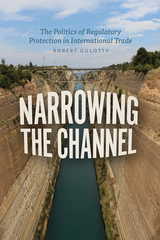
Narrowing the Channel demonstrates that globalization and globalized firms can paradoxically hinder rather than foster economic cooperation as larger firms seek to protect their markets through often unnecessarily strict product regulations. To illustrate the problem of regulatory protectionism, Robert Gulotty offers an in-depth analysis of contemporary rulemaking in the United States and the European Union in the areas of health, safety, and environmental standards. He shows how large firms seek regulatory schemes that disproportionately disadvantage small firms. When multinationals are embedded in the local economy, governments too have an incentive to use these regulations to shift profits back home. Today, the key challenge to governing global trade is not how much trade occurs but who is allowed to participate, and this book shows that new rules will be needed to allow governments to widen the benefits of global commerce and avoid further inequality and market concentration.

Lawyers and corporations have a vital interest in the regulation and protection of industrial property—patents, designs, trademarks, trade names, and repression of unfair competition—and in the problems raised by agreements between enterprises, nationally and internationally. Since World War II, there has been increasing ferment for changes in the whole system of industrial property. Pressures have been building up from administrations concerned with the functioning of the patent and trademark system; from private enterprises affected by delays, costs, and insecurities of the system; from developing countries anxious to receive and adapt foreign technology at reasonable cost and without excessive restriction; and from the increasing tendency of antitrust law to curb even legal monopolies in order to ensure free competition.
This major work describes the national and international regime of patents, trademarks, technological know-how, and related rights of industrial property; the conflicting interests and demands for recognition and satisfaction in this field; the international efforts and arrangements achieved for harmonization of law and procedure; the problems involved in the transfer of technology for the technical and economic development of countries pressing for assistance; and the controls established by statutory and decisional law against restriction of competition by the exercise of industrial property rights.
READERS
Browse our collection.
PUBLISHERS
See BiblioVault's publisher services.
STUDENT SERVICES
Files for college accessibility offices.
UChicago Accessibility Resources
home | accessibility | search | about | contact us
BiblioVault ® 2001 - 2024
The University of Chicago Press









